The only time I ever saw the Spanish Steps empty was during a Roma-Lazio soccer game — until Christmas 2020, when we visited Rome for a month from San Francisco, where we were then posted. As my boots echoed off the empty Spanish Steps, racing home under the moonlight to observe the lockdown curfew imposed by Covid-19, I felt like Ginger Rogers subbing for Audrey Hepburn on my Roman holiday.
We visited Rome during a time when Covid-19 was at its peak and none of us had any idea if we would ever be vaccinated, let alone when. For us, almost a year in to the pandemic, with our respective parents both in New York and in Italy, the urgency to be with them during lonely times outweighed the risk in traveling to see them. We ignored opposing voices to our trip and took off.
What we found in Rome was a ghost town. That night at the Spanish Steps, Rome looked as beautiful as it felt eerie. No tourists lingered languidly on the steps; no chain-smoking Italians huddled around La Barchetta fountain at its feet. Only Carabinieri were on the watch for people like us, running around too close to curfew.
My kids, my husband and I had this historic monument, in a turn a historic moment, all to ourselves. In a normally-packed piazza that then resembled an abandoned stage set, we slinked down the Spanish Steps like actors early for a performance with no audience. As much as we wanted to break into song and dance, we revered the silence.
We had left a similarly shut-down San Francisco, yet we had hoped to find a healing Italy, tragically struck by the pandemic a couple of months before us. Instead, we found the same wounds as those in America, both nations adjusting their bandages, sewing up stitches, living with their respective scars, and continuing to ache.
This was not the Italy we had left a year ago upon our previous trip, the Italy we longed for from afar. This was an Italy devastated by a global pandemic, observing a strict, daily curfew, with regional closures preventing travel within the country, and the numbers of positive cases rising yet again as available hospital beds were declining.
What also struck me was that I did not feel like the same person who had moved away from Rome five years earlier. I recognized Rome’s historic backdrops but I didn’t recognize myself within them. I felt like a different actor on a familiar stage set. I now observed Rome, Romans and their respective habits and traditions with a newfound perspective after adopting others while living elsewhere.
At that time, I was heading into my fifth and final year of being posted in San Francisco. In July 2021, we would move back to Rome, to our old apartment, to our old friends, to in-laws down the street, to a then-still-unknown job for my husband, to new schools for the kids. The backdrop of our lives would be much the same as it was in the various chapters we lived in Rome. Yet I was reluctant to be labelled again by the Italians as L’Americana, La Straniera. Despite my knowledge of the Italian language and culture, I couldn’t help but think that Italians would always think of me as The American, forever The Foreigner.
Rome had already been home to me in three previous chapters of my formative years, in my twenties and thirties. First, as a single, twenty-something college graduate employed at The American Academy in Rome. Secondly, after a year of graduate school in New York, I returned to Rome as a reporter working for American media, and eventually became engaged to an Italian diplomat. Third, after my husband’s first four-year diplomatic post in Brussels and the next four in Tel Aviv, I returned to Rome as a married thirty-something-year-old mother of two young kids.
In this fourth chapter, I have returned to Rome as a forty-something mother with teenage kids, hoping to complete a book about the adventures we’ve encountered while outside of Italy.
Much has changed within me in my five years spent living in San Francisco as an adopted Italian: there, I expressed myself as more than The Wife Of. There, I settled into becoming me.
In California, where I could finally let loose in my native tongue, I felt people leaning in to hear me speak as they hadn’t in previous postings. It made me want to talk more as I watched their curiosity evolve in wanting to hear my stories, and in encouraging me to write more about what I was living.
While an enforced lockdown during the global pandemic may have hurt many, I settled in to it like a bear long overdue for hibernation. I made a business card for myself which listed my pen name rather than my married name, and placed a typewriter icon on it to celebrate my profession. I wrote, I read, I connected with other authors, and I dove into a literary community I had never found time for previously. The introvert in me flourished — I bloomed like a sunflower despite being mostly indoors. I exhaled on the page.
My goal was no longer striving to live up to the role for which I was technically posted in San Francisco but, instead, to pen the book I’ve always longed to write. I showed up in California convinced I had to play the role of The Perfect Wife Of. But, over time, I realized that the only one really obsessed with that role was me. Instead of hiding behind my Americanness while speaking Italian, I finally settled into the empowerment of having two languages and cultures in my life.
We walked home every night from my in-laws’ house near the Villa Borghese to a rented apartment in Rome’s historic center. Our walk home often felt like a stroll through a forbidden city as no else seemed to be visiting it except us. We may have been the only tourists in Rome for Christmas, and never once did we hear English or other foreign languages spoken around us. One homeless woman, hearing us converse in English as we passed by her personal space on the front stoop of a church, chased us away, shrieking that we fly home to America to be vaccinated.
On our nightly walk, we encountered police cars circling the neighborhoods while enforcing the Covid-lockdown curfew. We observed vacant churches, monuments surrounded by pigeons, and piazzas void of the elderly usually planted on benches. Gone were the sounds of clinking spoons and coffee saucers reverberating off open doors of coffeeshops — all places for a cappuccino or a glass of wine were closed. Newspaper stands sold N95 masks next to comic books. Pharmacies housed outdoor tents for spontaneous Covid-19 testing (of which we took multiple ones while there). The day we purchased a suitcase to carry home Christmas gifts the sales clerk looked at us suspiciously, incredulous that we had made it all the way from California when she couldn’t even visit her sister in Milan.
One Sunday night, it was drizzly and cold, and we had to be home by the 10pm curfew. It was already 9:30pm with not a taxi in sight. The bus passed infrequently so our only option was to walk home from my in-laws’ house after dinner. If we walked quickly, we could make it in time and avoid a ticket from the police.
The four of us bundled up in our down coats, hats, and gloves, and stumbled over uneven cobblestones, precarious rivets in poorly-maintained sidewalks. We shuffled through wet leaves and frequently passed overstuffed, neglected garbage bins. A few cars and mopeds whizzed by with masked passengers inside and windows slightly rolled down.
As we entered the park of the Villa Borghese at the Zoo, my son spotted four Uber-Lime electric push-scooters lined up like personal chariots waiting for us. He looked at us with pleading eyes, and argued that riding them would speed up our return home in time for the curfew.
It felt irresponsible to ride them in the dark. Their headlights resembled Itty-Bitty book lights. It was terribly dangerous to ride them without helmets, something we would have never condoned in San Francisco. But, we had the Uber app already downloaded on our phone, and, shucks, it could be fun.
An instant flashback struck me of the first time I drove a moped by myself over Rome’s cobblestones and the first time I rode behind my husband on his moped with my arms wrapped around his waist. I beamed, shrugged my shoulders at my husband who was looking at me for approval, and I nodded. My kids grinned.
After a few swipes and downloaded transactions from Silicon Valley to the Eternal City, we each instantly became a driver of our own personal scooter, and took off in tandem through a park full of some of my fondest memories of Rome.
It was Modern Times meets the Baroque and Renaissance as we revved our electric handles to visit one of Rome’s jewels by night as if being driven by a horse and buggy carriage “in the olden times,” as my kids said, with not a soul in sight.
We passed the Bioparco Zoo where my daughter had attended Animal camp as a six-year-old and fallen in love with a hippo. I imagined the lion inside his den that frequently roared at night — a former American Ambassador had told me he often woke up with a fright as his bedroom in the US private residence was only a quarter of a mile from the Zoo’s entrance.
We sailed past water fountains churning water from the underground aqueducts, with spouts I had learned to manipulate so water could shoot up towards my mouth.
We passed the Tempietto di Diana where our family dog used to cool off under its columns, and fountains where she used to wade, her paws pushing around coins thrown in for good luck. A stone’s throw away from these monuments was the vet’s office that had issued her first flimsy, canine passport needed to fly to Belgium, Israel, and America.
We rolled along the path where I used to push my newborn son in a stroller while I called home to the States to catch up with other young, tired mothers also feeling inadequate and lonely. It was the same path along which I would later walk my kids to their elementary school, and then sit on a bench watching them play soccer and listening to their Italian sports’ vocabulary expand with every punt.
My dental crowns chattered as I sped up to keep up with my family. I slowed down momentarily to take in the empty Pincio piazza overlooking the Piazza del Popolo, which once housed the skating rink on which I first met my husband a cold December night twenty-five years ago.
With age, my eyesight has worsened and hindered my vision at night, which didn’t help as we navigated our way home. One false move and any of us could have ended up in the hospital with a concussion. I couldn’t help but recall my twenty-something moped accident, hitting a stray cat, resulting in a broken wrist, my starter-kit as a Roman newbie. It wasn’t clear that any ambulances would show up if called with the entire city in lockdown. This made the whole ride home feel just as racy, reckless and exciting as flying 6,200 miles in a global pandemic to be with our family. It was just that risky but felt just right.
As my kids and husband scooted ahead of me, I happily followed in their trail, proud of their thirst for adventure and desire to lead. Our cheeks were rosy, our hair tousled by the wind, and teardrops trickled out of my near-sighted eyes like those I shed when downhill skiing.
Or maybe the tears fell from the pure joy of the ride. I felt free, independent and courageous, American and Italian, loved and in love with the life we have made for ourselves, split between two cultures, two languages, two countries, and two worlds, with hearts big enough for all of it.

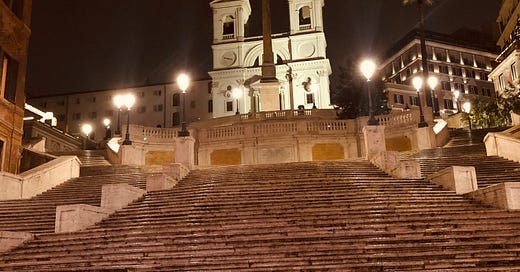



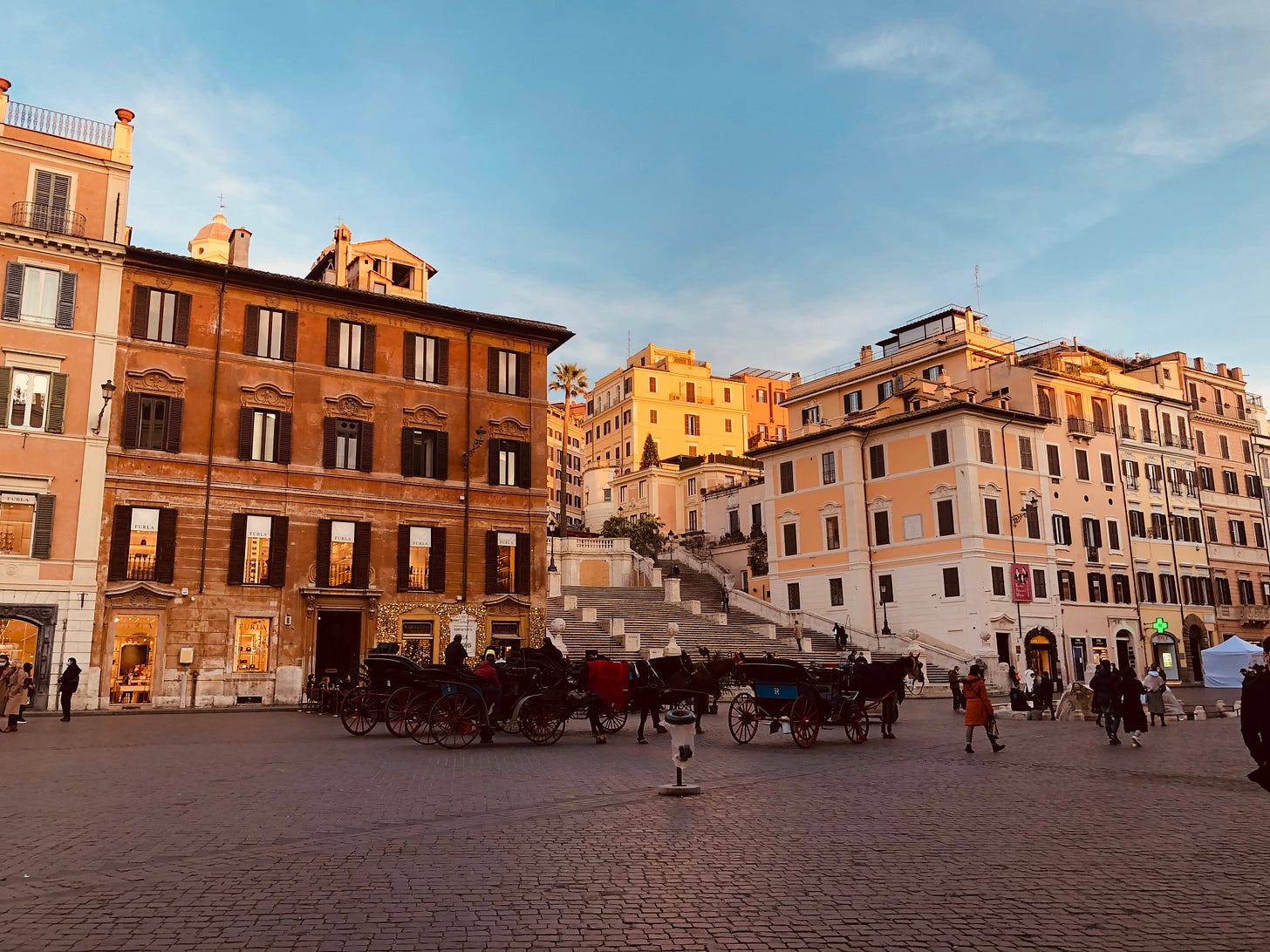
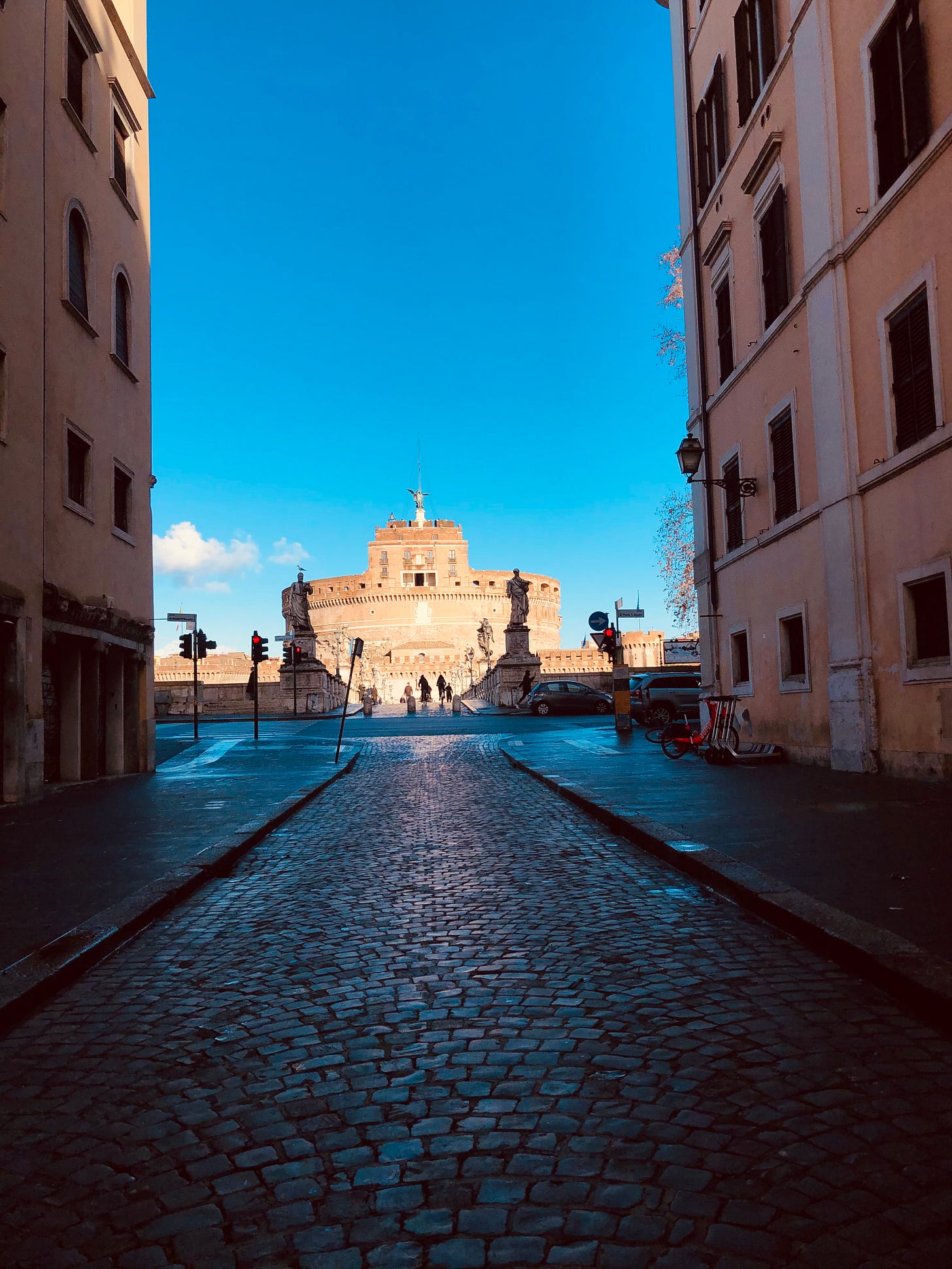
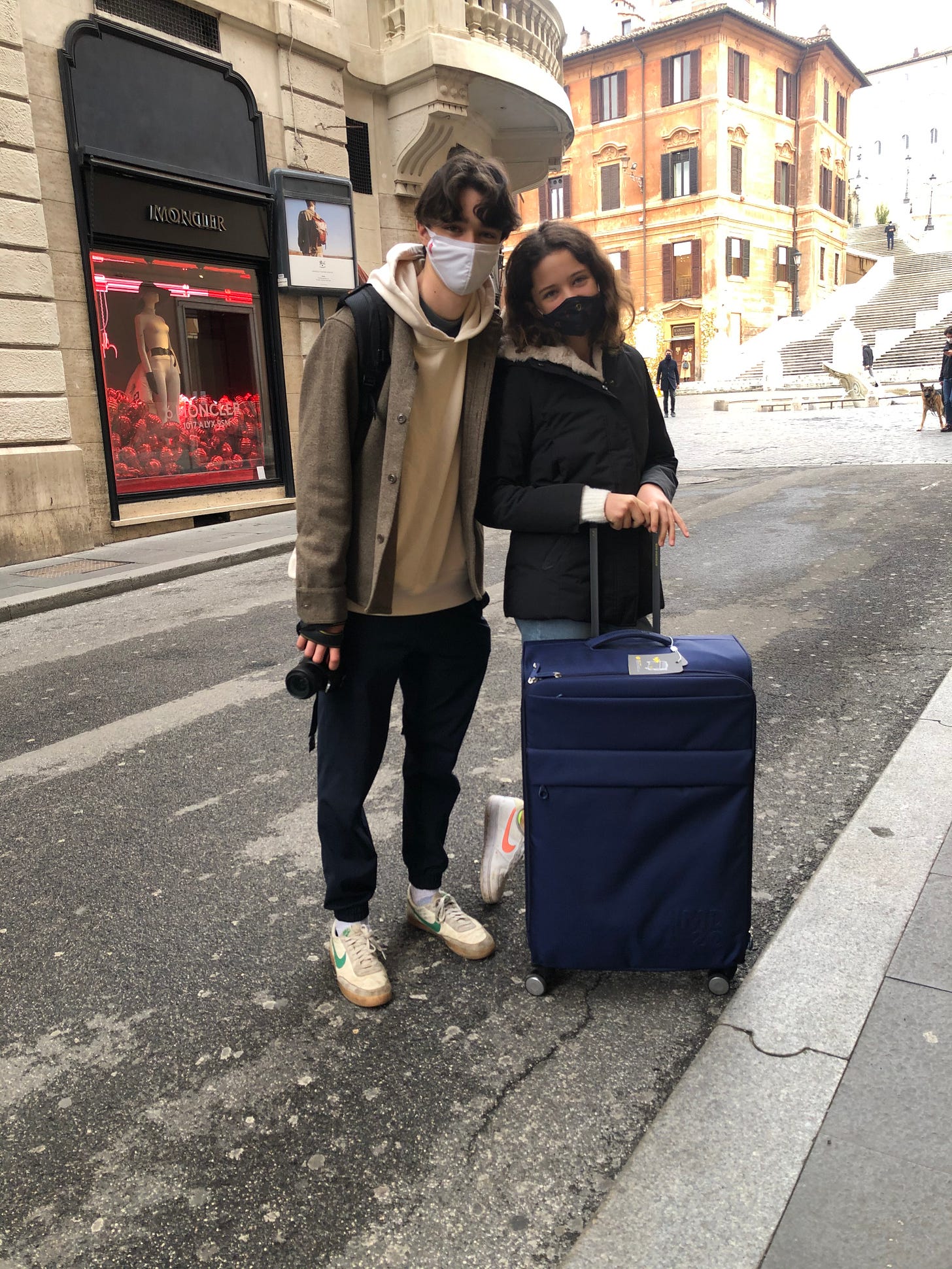
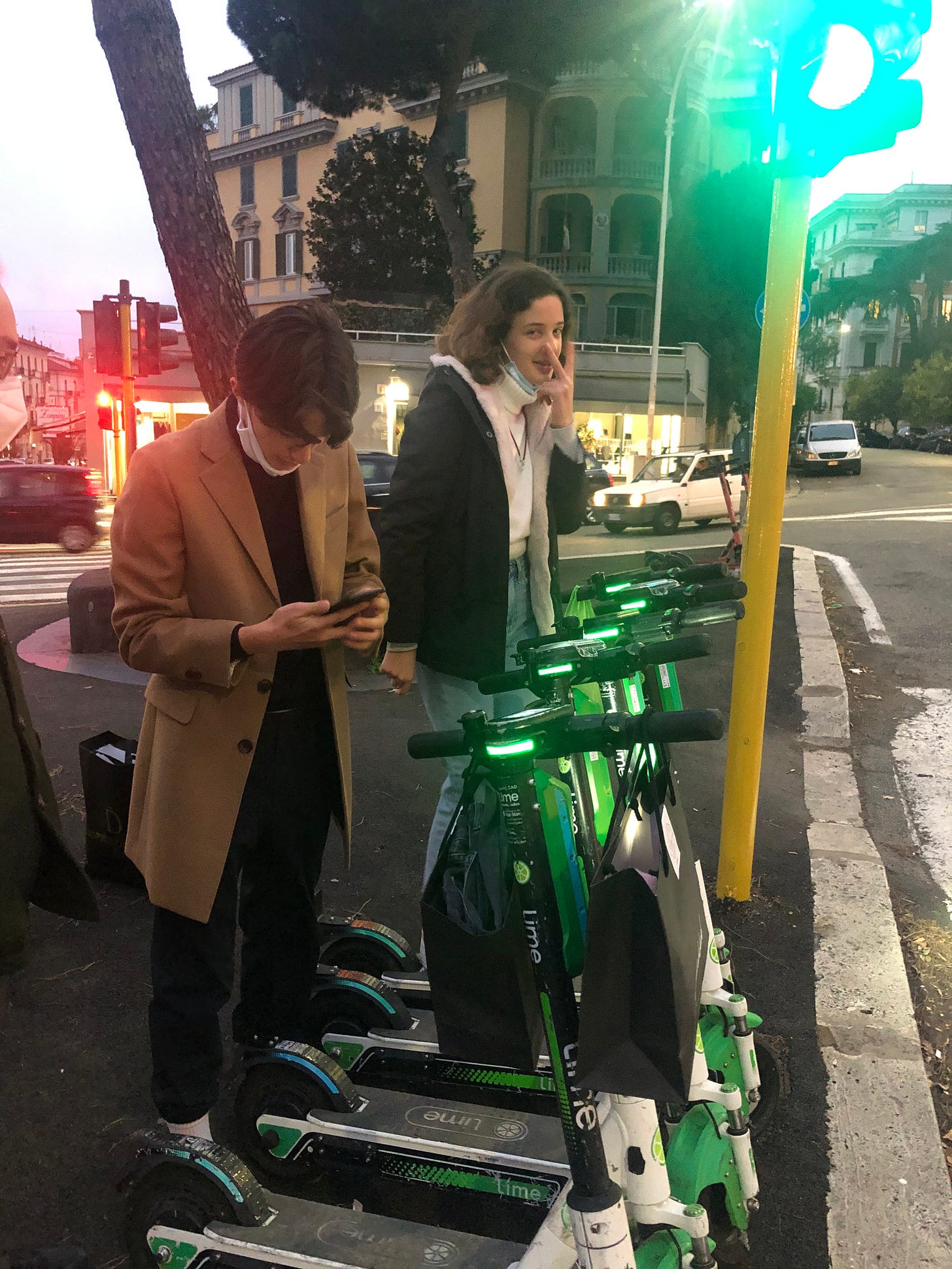
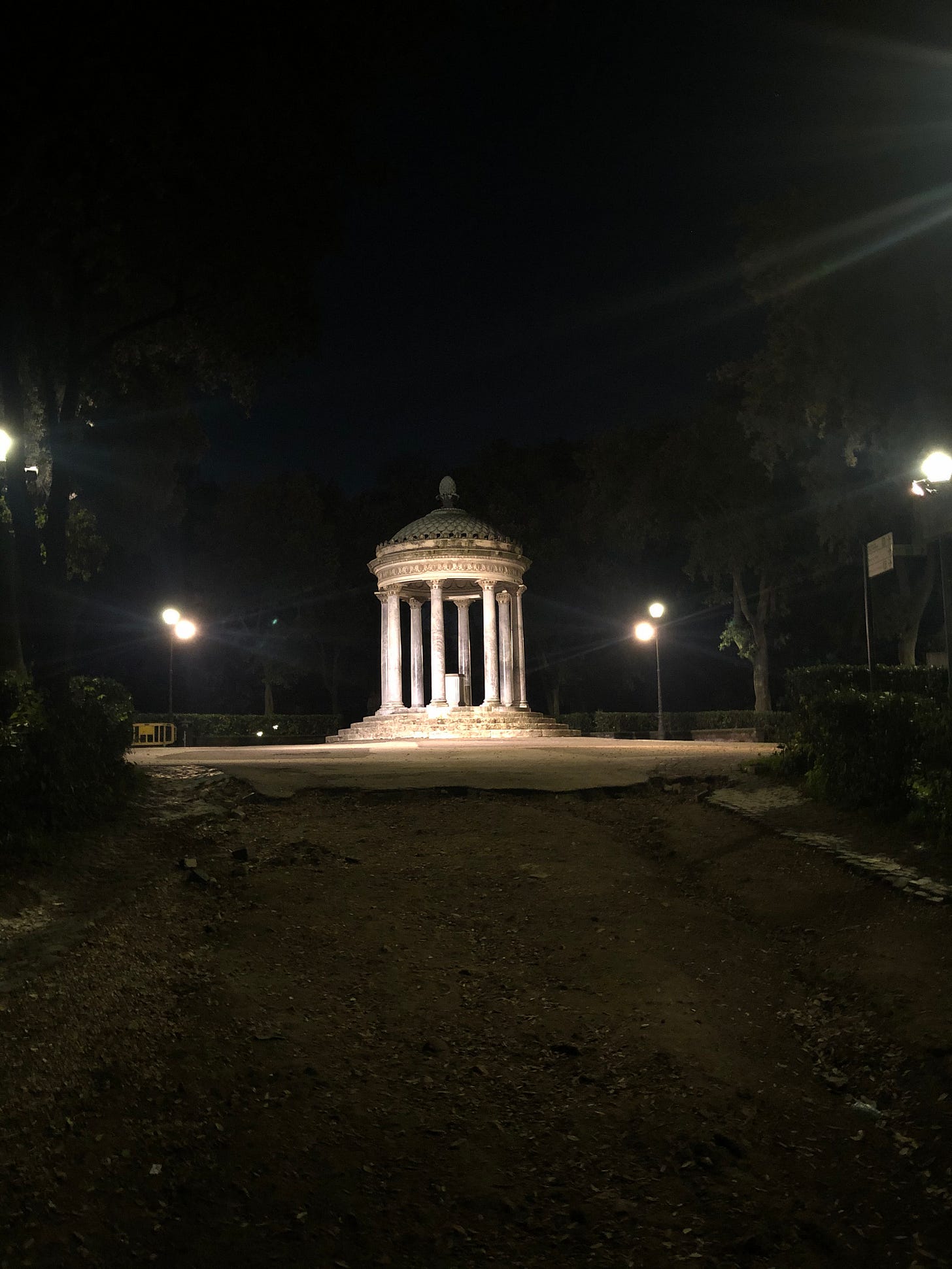
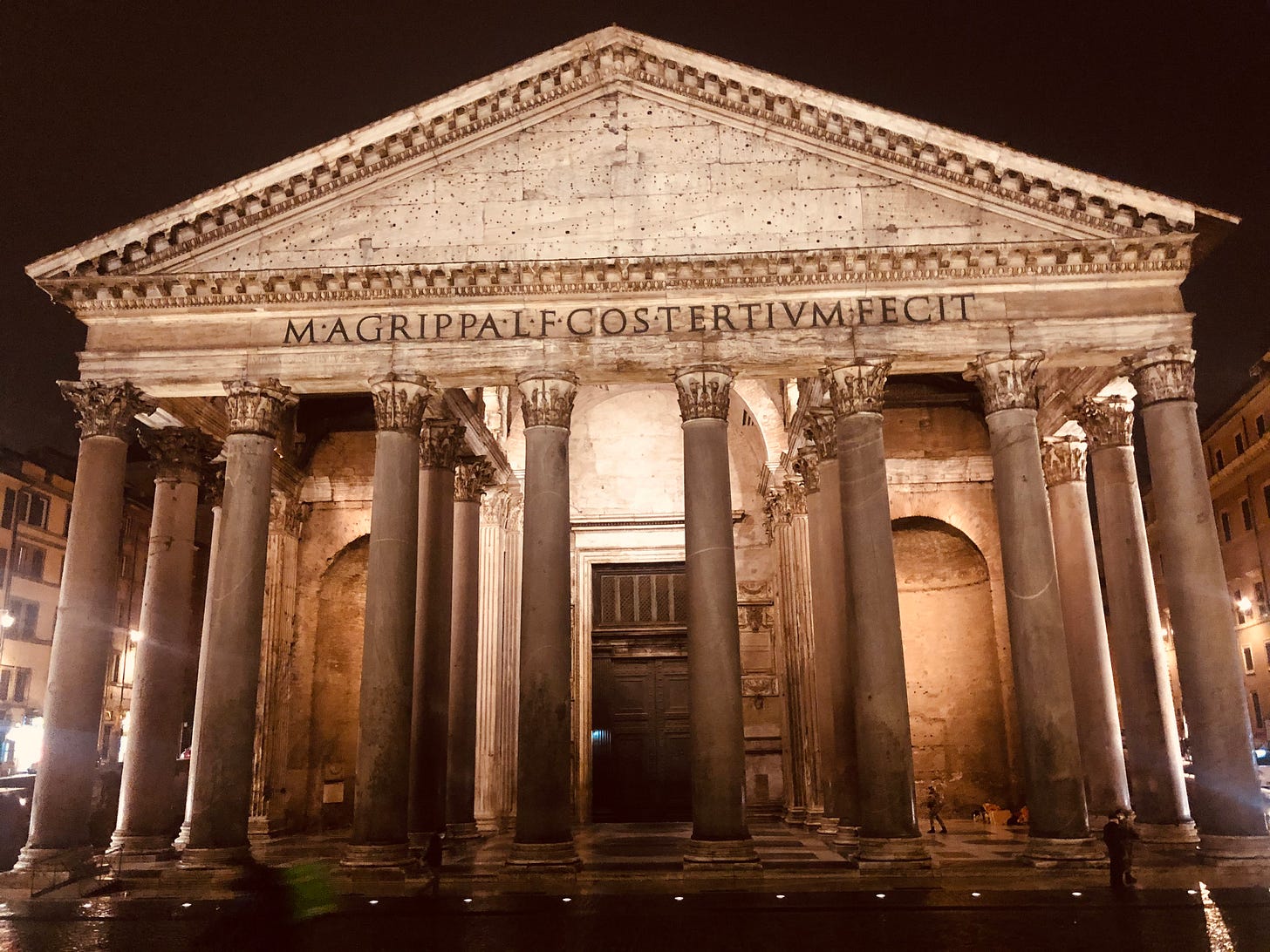
Love, love, love this Sheila!! And cannot WAIT to be in the eternal city again with you all in less than a month Xx
Thank you, dear Summer! And we can't wait to see you SOON!!!